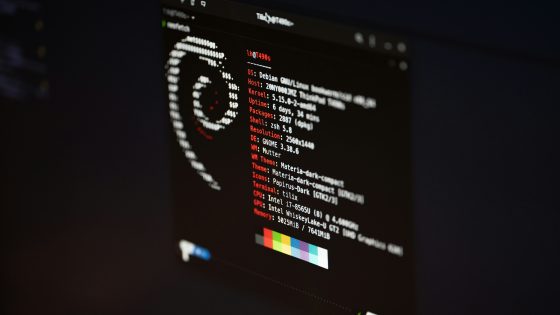Digital language is the language of modern times! Why doesn't Slovenian education teach it?

They participated in the discussion Assoc. dr. Andrej Brodnik, full professor, Faculty of Mathematics, Natural Sciences and Information Technologies, University of Primorska and head of the RINOS group; dr. Boris Horvat, CEO and co-founder of ACEX, CEO and co-founder of Abelium and co-chair of the AmCham Future-Ready Commission; Assoc. dr. Irena Nančovska Šerbec, Department of Mathematics and Computer Science, Faculty of Education, University of Ljubljana and M.Sc. Ajša Vodnik, CEO, AmCham Slovenia and president of AmChams in Europe.
M.Sc. Ajša Vodnik introduced by saying that we must be prepared for the future by understanding and using technology, as it is of vital importance for all social sectors: "In the AmCham Slovenia business community, we are aware of the needs of the economy and that it is the economy that can help create a better society. We live in a digital age, a time when everything is happening with the information society and when everything is happening in such a way that we need to understand what technologies we use. And if we do not enable our children and young people to have the same knowledge and the same opportunities as the rest of their peers, we will also be left behind as a society and economy. And it's not just about the economy. It is about every industry that is important to our lives. From healthcare to ordinary commerce, if you will. Therefore, it is important that they know and that we know what knowledge is and what skills are. And introducing the digital language and knowing how to speak it is certainly the foundation for us to be a better, more innovative and creative society."
By developing new technologies and pursuing goals digital transformations The development of digital competences and the necessity of their inclusion in education is no longer an option, but is becoming one of the key focuses for actively designing the future of both the individual and the entire society. By including the mandatory subject of digital language (previously communicated as computer science and informatics – RIN) in all phases of education, students and pupils will mastered both the fundamental concepts of computer science and learned how to solve problems with the help of computer (logical) thinking. They will be able to transfer these competencies to other areas of their activity, which will give them an advantage when looking for a job. Without the systematic development of digital competences, young Slovenians will not be able to compete with their peers from other EU countries and will be deprived of jobs with high added value. Today's event was a key opportunity to present facts and arguments FOR the general public and the Slovenian media space.
In light of the initiative Digital compass to 2030: Europe's path to the digital decade, based on four areas, namely skills, secure and sustainable digital infrastructure, digital transformation of businesses and digitisation of public funds, we are aware that its main objective – by 2030, at least 80 % of all EU adults should have basic digital skills – we will not be able to achieve this in Slovenia without the introduction of a course that will systematically provide knowledge of computer science and informatics.
Young people in Slovenia lag far behind their peers in other EU member states
Despite the general belief that digital competences are well developed among young people, data research from 2022 show that young people in Slovenia lag far behind their peers in other EU member states. At the meeting, we emphasized that pupils and students have problems in higher education and higher education, as they have to devote between 10 % and 20 % time to the delayed acquisition of RIN basic knowledge. The Slovenian school curriculum for primary and secondary schools currently covers only 0.6 % of computer and informatics content.
To be specific – young people in Slovenia are ranked in terms of the development of digital competences for 7.8 % are lagging behind their peers from other EU countries, which have already introduced a compulsory subject with RIN content in primary and secondary schools. In Slovenia, 63.4 % persons in the age group of 16-24 years have basic or more than basic general digital skills. The European average in the same age group is 71.2 %. The digital knowledge of young people in Slovenia is limited to the use of smartphones for accessing entertainment content on social networks and communication. Many European countries have already implemented or are in the process of implementing reforms in approaches to teaching digital competences.
dr. Irena Nančovska Šerbec pointed out at today's event that no one should own the curriculum, as the curriculum is aimed at development and that there is a shortage of teachers because no one chooses a subject they cannot teach and said: "I believe that it is absolutely necessary to introduce digital competences for all students, as these enable the inclusion of our students in the digital society. But it is even more important to introduce the teaching of basic computer content, and I especially emphasize that it is necessary to introduce the subject of computer science. In the computer science subject, we teach and introduce knowledge and content similar to what is introduced by all advanced countries, for example countries from our surroundings, including Croatia, the Czech Republic, Slovakia and other countries. These contents mainly relate to approaches and knowledge in solving problems, including their definition. And these skills enable significantly more than user-oriented competences alone."
dr. Andrej Brodnik said that we are not making progress, because for a long time we have seen these issues as problems and not as challenges, and warned that we are currently putting Slovenian youth in a disadvantaged position: “300 years ago, James Watt invented the steam engine. And in order to know how to use it correctly, we had education. We were educated in the field of physics and the like. Today we have computers, and these computers permeate every pore of our activities. Do we have education for them? No! Do we understand how they work? No! This only applies to Slovenia, which means that Slovenian children are becoming less privileged compared to their peers elsewhere in Europe. This is our problem and this is our responsibility."
dr. Boris Horvat pointed out that we are at the beginning of a new industrial revolution that will redefine professions. He emphasized the need for a sufficient pool of personnel for the development and design of digital technologies and tools in Slovenia and warned that this process will take a long time, so we must get on the right track today: "We are at the beginning of the industrial revolution, which is supported by digitization and, more recently, by artificial intelligence. This field is developing tremendously and we don't have much time left to decide whether we want to empower our children so that in the future they can realize their ideas alongside and on an equal footing with their peers in the world, or whether they will just remain followers and use tools that they will be developed by others. I believe that it is essential for Slovenia and for our future to enable our children to learn the digital language and to use all the tools that are available today. "
The time has come for computer science and informatics to become a compulsory subject in our primary schools
He also made a statement for today's meeting dr. Uroš Ocepek, TEACHER of professional modules in the field of computer science at Trbovlje Secondary Technical and Vocational School, Teacher of the Year 2022 and the first Slovenian teacher to be ranked among the 50 best teachers in the world - at the Global Teacher Prize 2023 selection: "The time has come for subjects in the field of computing and informatics to become a compulsory subject in our primary schools. The last triad, which is the most important, especially from the point of view of career decision-making, does not contain a single hour in the field of computer science and informatics. You will say, because we are introducing digital competences. Digital competences teach us to hold a pen. Computing and informatics, and these subjects teach us to write stories. As a computer science teacher, I have registered many innovations together with my students. From the field of virtual reality, augmented reality, artificial intelligence and even from the field of mind painting. Our students have achieved all this because they are attending the computer science program. In the vernacular, they systematically learn about the fields of computer science […] But for all innovations, they had to have other, in-depth knowledge from some other domain. Why? Because with the help of information, communication technology, computers, if you like, and artificial intelligence, we would innovate significantly faster. […] I myself am ready to help, even in the renovation and preparation of materials. In a world where technology shapes our everyday lives, how can we justify not giving our children the skills they need to succeed? […] We say that we are a country of innovators, but given the vision that the decision-makers currently have, we will soon say that we were a country of innovators. I don't want Slovenia to lag behind, I want it to lead. To not only follow global trends, but to shape them. However, without RIN content, we will not be able to achieve this. "
AmCham Slovenia is therefore working within the framework of AmCham advocacy in cooperation with the RINOS group to the earliest possible introduction of digital language (previously communicated as computer science and informatics – RIN) as a mandatory subject in primary and secondary schools. The topic is also highlighted at events Commissions ready for the future and external events related to technology, cybersecurity and IT science. As part of our efforts, we were hosted by the Ministry of Education and the Ministry of Digital Transformation.
Within the framework Partnerships for change We supported the group's efforts with a wide group of partners RINOS, which already in 2016 prepared an action plan for introducing the subject of digital language, teacher education and also envisaged the parallel introduction of digital competences in all other subjects. However, we emphasize that simply introducing digital competences into existing school subjects will not be enough. Even if we welcome the renewal of the curricula, it unfortunately does not foresee the necessary introduction of a new subject across the entire vertical, which must become a mandatory part of education in the digital age. One of the sub-goals of the strategic goal for the development of digital education (literacy) stated by the National Education and Training Program for the period 2023-2033, namely, predicts the introduction of the compulsory subject computer science only in the 5th and 6th grades of primary school, in the remaining grades (from 1 . to the 4th and from the 7th to the 9th grade) should only include the contents of computer science and informatics. We have already called on those responsible to prioritize the introduction of the compulsory subject computer science and informatics in primary and secondary schools as one of the urgent measures in the proposal of the Act on Amendments and Supplements to the Primary School Act. Teaching RIN content as part of other subjects has proven to be unsuccessful, as many teachers do not have the basic skills to teach RIN content, and curricular guidelines are unclear. As a result, teaching is inconsistent and inconsistent and depends on the motivation and resourcefulness of individual teachers.



























